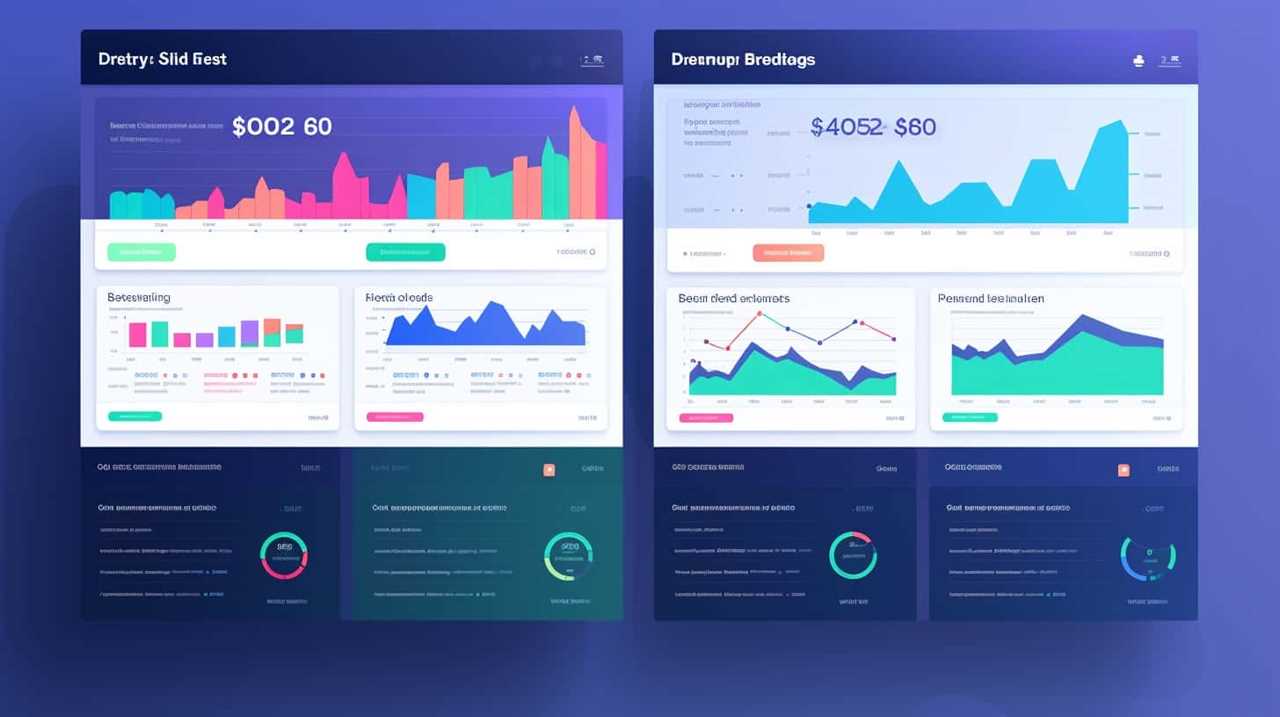Looking to boost your online presence in your community? Rely on our assistance!
In this article, we’ll share powerful strategies and tactics for local service providers to achieve higher rankings in search engine results. From understanding local search ranking factors to optimizing your website for mobile users, we’ll guide you step-by-step towards SEO success.
Get ready to maximize your visibility, attract more customers, and become the go-to provider in your area.
Let’s dive in and take control of your local SEO game!

Key Takeaways
- Local SEO focuses on optimizing online presence for specific geographical areas.
- Local directory listings increase chances of being found by potential customers.
- Citations are crucial for local search optimization.
- Positive reviews can boost visibility, credibility, and rankings in search results.
Importance of Local SEO
One of the key factors in successfully ranking higher in your community is understanding the importance of local SEO. Local SEO focuses on optimizing your online presence to attract customers in your specific geographical area. It involves various strategies, such as local directory listings and local citation building, to improve your visibility in local search results.
Local directory listings play a crucial role in local SEO. These directories are online platforms that list businesses within a specific location. By listing your business in these directories, you increase your chances of being found by potential customers. It not only provides valuable information about your business, such as contact details and website, but also helps in establishing credibility and trust.
Another important aspect of local SEO is local citation building. A local citation refers to any mention of your business name, address, and phone number (NAP) on other websites, directories, or social media platforms. These citations validate the existence and legitimacy of your business, boosting your local search rankings.
Understanding the significance of local SEO, including local directory listings and local citation building, is crucial for ranking higher in your community. However, it’s just one part of the puzzle. To achieve optimal results, it’s essential to delve deeper into understanding the various local search ranking factors that influence your online visibility and success.

Understanding Local Search Ranking Factors
Now let’s delve deeper into the various local search ranking factors that influence our online visibility and success in our community. Understanding these factors is crucial for effective local search optimization and local citation management.
Here are five important factors to consider:
- Relevance: Ensuring that your website and content are relevant to your target audience is key. This includes using relevant keywords, creating informative and engaging content, and optimizing your website for local searches.
- Distance: Proximity plays a significant role in local search rankings. Google considers the distance between the user’s location and the business when determining relevance. To improve your ranking, it’s important to have a physical presence in the target area and optimize your website with location-specific information.
- Prominence: Prominence refers to how well-known and reputable your business is. Factors such as online reviews, ratings, and backlinks contribute to your prominence. Encourage satisfied customers to leave reviews and actively manage your online reputation.
- Citations: Local citations are mentions of your business name, address, and phone number on other websites. They’re crucial for local search optimization. Ensure that your citations are accurate and consistent across all platforms and directories.
- Website Authority: The authority of your website is determined by factors such as the number and quality of backlinks, domain age, and overall website quality. Building high-quality backlinks and optimizing your website’s technical aspects can help improve your website authority.
Keyword Research for Local Service Providers
To effectively optimize our online presence and improve our local search rankings, local service providers like us need to conduct thorough keyword research. Keyword research is a crucial step in our SEO strategy, as it helps us identify the terms and phrases that potential customers are using to search for our services in our local area. By understanding these keywords, we can tailor our website content and marketing efforts to align with what our target audience is looking for.
One important aspect of keyword research for local service providers is identifying relevant local service provider directories. These directories are online platforms that list local businesses and service providers, making it easier for potential customers to find us. By including our business in these directories and optimizing our listings with the right keywords, we can increase our visibility and attract more local customers.

In addition to directories, optimizing our Google Maps listing is another key factor in local keyword research. When potential customers search for local service providers, Google Maps often displays a list of businesses in their immediate area. By optimizing our listing with relevant keywords, we can increase our chances of appearing in these search results and driving more traffic to our website.
On-Page Optimization Techniques for Local Businesses
When optimizing a website for local businesses, there are several on-page techniques that can help improve rankings.
First, conducting thorough keyword research is essential to identify relevant terms and phrases that local audiences are searching for.
Additionally, utilizing localized meta tags, such as title tags and meta descriptions, can help search engines understand the geographical relevance of the content.

Keyword Research Tips
As local service providers, we prioritize utilizing keyword research techniques to optimize on-page content for our community. Conducting thorough local keyword research is essential for understanding the specific terms and phrases that our target audience is using to search for our services.
By incorporating these keywords strategically into our website content, we can increase our visibility in local search results. Additionally, competitor analysis is another crucial aspect of keyword research. By analyzing our competitors’ websites and identifying the keywords they’re targeting, we can gain valuable insights and find opportunities to differentiate ourselves.
Furthermore, it’s important to consider long-tail keywords, as they often have less competition and can attract highly targeted traffic.
Lastly, regularly monitoring and updating our keywords based on trends and changes in our industry is essential for staying ahead of the competition and maintaining our search rankings.

Localized Meta Tags
We optimize our website’s on-page content for our local community by implementing localized meta tags. Localized meta tags are HTML tags that provide information about a web page’s content. They help search engines understand the geographical relevance of the page and improve its visibility in local search results.
To effectively optimize our website, we start by conducting localized keyword research to identify the most relevant keywords for our local audience. We then incorporate these keywords into our meta title, meta description, and meta keywords tags. Additionally, we optimize our local landing pages by including location-specific information, such as our address, phone number, and service area.
By implementing localized meta tags, we improve our website’s chances of ranking higher in local search results and attracting more local customers.
Now, let’s move on to the next section where we’ll discuss content targeting our local audience.

Content Targeting Local Audience
To effectively target our local audience, we optimize our on-page content by incorporating location-specific information and utilizing on-page optimization techniques for local businesses. This helps us improve our visibility in search results and attract potential customers in our community. Here are some key strategies we employ for content targeting local audience:
- Research local keywords: We conduct thorough keyword research to identify relevant local search terms that our target audience is using.
- Create location-specific landing pages: We create dedicated landing pages for each location we serve, optimizing them with local keywords and providing valuable information about our services in that area.
- Optimize title tags and headings: We ensure that our title tags and headings include local keywords to increase our chances of ranking higher in local search results.
- Incorporate local references in content: We include references to local landmarks, events, or organizations in our content to make it more relevant to our local audience.
- Encourage local reviews and testimonials: Positive reviews and testimonials from local customers not only improve our credibility but also provide valuable local content for search engines.
Building High-Quality Backlinks for Local SEO
Building high-quality backlinks is essential for improving local SEO rankings and increasing visibility for local service providers. Backlinks are links from other websites that point back to your website, indicating to search engines that your website is authoritative and trustworthy.
When it comes to local SEO, building backlinks from reputable local directory listings and through local citation building can significantly boost your rankings.
Local directory listings are online directories that list businesses in specific geographic areas. By ensuring that your business is listed in popular local directories, you can increase your chances of getting high-quality backlinks. Look for directories that are relevant to your industry and location, as these will provide the most value.

In addition to local directory listings, local citation building is another effective strategy for building high-quality backlinks. Local citations are mentions of your business’s name, address, and phone number on other websites, even if there’s no direct link. These citations help search engines verify the accuracy of your business information and improve your local SEO rankings.
When building backlinks for local SEO, focus on quality over quantity. Seek out authoritative websites in your industry and local community to ensure that the backlinks you acquire are valuable and relevant.
Leveraging Online Reviews for Local Reputation Management
When it comes to local reputation management, online reviews play a crucial role in influencing rankings. Positive reviews can boost your visibility and credibility, helping you rank higher in search results.
However, managing negative feedback is equally important. Responding promptly and professionally to negative reviews can help mitigate their impact on your reputation and show potential customers that you’re committed to providing excellent service.

Review Impact on Rankings
By leveraging online reviews, we can effectively manage the local reputation of our business and improve our rankings in the community. Online reviews have a significant impact on our search engine rankings and can greatly influence potential customers’ perception of our business.
Here are five key ways that reviews can impact our rankings and help us improve customer satisfaction:
- Higher star ratings and positive reviews can boost our search engine visibility, leading to higher rankings in local search results.
- Reviews provide fresh and relevant content for search engines to crawl, which can improve our website’s organic visibility.
- Positive reviews and high ratings can build trust and credibility with potential customers, increasing the likelihood of them choosing our business over competitors.
- Reviews can provide valuable insights into our customers’ experiences, allowing us to identify areas for improvement and enhance customer satisfaction.
- Responding to reviews, both positive and negative, shows that we value customer feedback and are committed to addressing any concerns, further enhancing our reputation.
Managing Negative Feedback
To effectively manage negative feedback and leverage online reviews for local reputation management, we frequently respond to customer reviews and address any concerns raised. Managing customer complaints is crucial for maintaining a positive online reputation. When negative feedback arises, it’s important to respond promptly and professionally. This shows potential customers that we care about their satisfaction and are committed to resolving any issues.
By addressing concerns publicly, we demonstrate transparency and a willingness to improve. Handling online reputation requires a proactive approach, monitoring review sites and social media platforms regularly. Encouraging satisfied customers to leave positive reviews can also help counterbalance any negative feedback.

Utilizing Google My Business for Local SEO Success
Our local service provider’s success in local SEO relies heavily on utilizing Google My Business. Google My Business is a powerful tool that allows us to manage our online presence and improve our visibility in the local search results.
Here are five key strategies for utilizing Google My Business to achieve local SEO success:
- Claim and verify our Google My Business listing: This is the first step in optimizing our presence on Google. By claiming and verifying our listing, we can ensure that our business information is accurate and up-to-date.
- Optimize our Google Maps listing for local visibility: By adding relevant keywords, photos, and a detailed description of our services, we can increase our chances of appearing in the local map pack, which is the section of Google’s search results that displays local businesses.
- Encourage customer reviews: Positive customer reviews not only improve our reputation but also have a positive impact on our local SEO rankings. We should actively encourage our satisfied customers to leave reviews on our Google My Business listing.
- Use local citation building strategies: Local citations are references to our business information on other websites, such as online directories. By ensuring that our business name, address, and phone number (NAP) are consistent across these citations, we can improve our local SEO rankings.
- Regularly update our business information: Keeping our business information, such as our address, phone number, and business hours, accurate and up-to-date is crucial for local SEO success. This ensures that potential customers can easily find and contact us.
Optimizing Your Website for Mobile Users
As we delve into optimizing our website for mobile users, it’s important to understand the significance of providing a seamless browsing experience for our audience. In today’s digital landscape, more and more people are accessing the internet through their mobile devices. Therefore, it’s crucial that our website is mobile responsive to ensure a positive user experience.
Mobile responsiveness refers to the ability of a website to adapt and display properly on different screen sizes and devices. This means that our website should be easily navigable, with clear fonts, and properly sized images. By optimizing our website for mobile users, we can increase our chances of ranking higher in local search results.

A seamless browsing experience on mobile devices can greatly impact our local SEO performance. When users have a positive experience on our website, they’re more likely to stay longer, engage with our content, and potentially convert into customers. This can lead to higher search engine rankings and increased visibility in our local community.
Now that we understand the importance of optimizing our website for mobile users, let’s move on to the next step: tracking and analyzing our local SEO performance.
Tracking and Analyzing Local SEO Performance
Now, let’s dive into how we can effectively track and analyze our local SEO performance.
Tracking local rankings and analyzing local search data are essential for understanding the effectiveness of our SEO strategies and making informed decisions to improve our local visibility.

Here are five key steps to help us track and analyze our local SEO performance:
- Utilize a keyword tracking tool: Track the rankings of our target keywords in local search results. This will provide insights into our visibility and competition in the local market.
- Monitor local search traffic: Analyze the amount of organic traffic coming from local searches. This data will help us understand the impact of our SEO efforts on driving local visitors to our website.
- Analyze local search terms: Identify the keywords that are driving the most traffic from local searches. This will enable us to optimize our content and target the right keywords for our local audience.
- Measure online reviews and ratings: Monitor and analyze online reviews and ratings on local directories and review platforms. Positive reviews can boost our local search rankings and reputation.
- Track local citations: Keep track of our business’s online mentions and citations across various directories and platforms. Consistent and accurate citations help improve our local SEO performance.
Conclusion
In conclusion, implementing effective local SEO strategies is crucial for local service providers to rank higher in their community.
While some may argue that it requires a significant amount of time and effort, the benefits far outweigh the initial investment.
By optimizing your website, utilizing online reviews, and leveraging Google My Business, you can attract more local customers and enhance your online reputation.

Embrace the power of local SEO to stay ahead of your competition and grow your business in your community.









